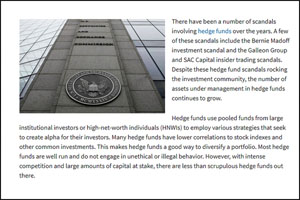Hedge Fund Scams
Cybercriminals, operating behind screens and from unknown hideouts, are sending dangerous emails that cause widespread panic and fear among the public. If authorities fail to take immediate action, these types of scamming activities are expected to increase multifold within the next year. Scammers use a variety of tactics and approaches to steal money from their targets. They send letters, parcels, gifts, and emails—and in some cases, they even visit homes directly to deceive people. In recent times, the African government has arrested several scammers operating within the country
of Zambia has recovered hundreds of dollars from scammer hideouts. However, the criminal network is growing at a breakneck speed, and authorities are still unable to fully control it. Both organized and unorganized scamming activities continue to operate across the globe. Among them, scams related to hedge funds have become increasingly prominent, with a growing number of victims falling prey to such fraudulent schemes. Over the years, the number of hedge fund-related scams has risen significantly. Some of the most notorious cases include the Madoff Investment Scandal and SAC Capital, which sent shockwaves throughout the investment community. Hedge funds typically manage pooled funds from large institutional investors and allocate them across diversified portfolios. However, fraudsters exploit this model by engaging in deceptive practices that mislead investors about the nature and performance of a hedge fund, leading to substantial financial losses.
These scams often rely on misleading information, such as exaggerated or entirely fabricated historical performance data, promising unrealistically high returns. In many cases, scammers operate Ponzi schemes, using funds from new investors to pay returns to earlier ones, thereby creating an illusion of profitability until the scheme inevitably collapses. In more extreme cases, fraudsters go as far as creating completely fictitious hedge funds, with no real investment activity, siphoning investor funds for personal gain. A lack of transparency, non-compliance with regulatory standards, and the use of aggressive or high-pressure sales tactics are also common elements of these scams. To safeguard against such fraudulent activities, investors must exercise a high level of caution. Conducting thorough research, verifying regulatory compliance, and remaining skeptical of promises involving consistent high returns are essential. Relying on credible, independent sources of information and maintaining a diversified investment strategy can greatly reduce the risk of falling victim to hedge fund scams. Staying informed and vigilant is crucial in fostering a secure investment environment and preventing financial exploitation.

In the Madoff investment scandal, the estimated fraud amounted to around $64 billion, and the principal of the organization, Bernie Madoff, was sentenced to 150 years in prison. Scammers often pose as reputable and experienced hedge fund investors. Their primary targets are wealthy businesspeople and high-net-worth investors. They send out numerous emails requesting recipients to invest their money in hedge funds, and if anyone responds, they proceed to request personal and financial information with the ultimate aim of siphoning large sums from their bank accounts. Even legitimate-looking hedge fund operating companies can deceive unsuspecting individuals by charging excessive management fees. A hedge fund is essentially a pooling system in which the company collects millions of dollars from investors. These companies often charge thousands of dollars as fund management fees, and over time, they may dissolve or liquidate the company, returning only what remains to investors after deducting hefty charges. Currently, there are no strict regulations in place to govern hedge fund operations, which creates an ideal environment for scammers to exploit. This regulatory gap enables fraudsters to operate with relative ease, making it crucial for investors to remain cautious. To safeguard their money, investors should follow essential precautionary steps and stay vigilant while engaging with hedge funds.

- They should not provide their personal and financial details to strangers or third parties.
- They should thoroughly verify the background of the company involved in the hedge fund business.
- They should check with others to see if they are also receiving similar emails from scammers.
- They should immediately disconnect any calls related to hedge fund offers.
- They should attempt to trace the identity of the caller who made the hedge fund-related call.
-
They should escalate the matter to the police or cyber cell immediately.




